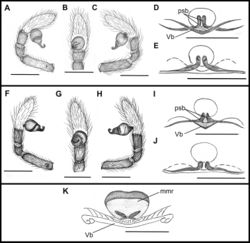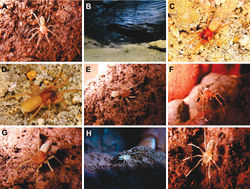Tisentnops onix
| Notice: | This page is derived from the original publication listed below, whose author(s) should always be credited. Further contributors may edit and improve the content of this page and, consequently, need to be credited as well (see page history). Any assessment of factual correctness requires a careful review of the original article as well as of subsequent contributions.
If you are uncertain whether your planned contribution is correct or not, we suggest that you use the associated discussion page instead of editing the page directly. This page should be cited as follows (rationale):
Citation formats to copy and paste
BibTeX: @article{Brescovit2016ZooKeys, RIS/ Endnote: TY - JOUR Wikipedia/ Citizendium: <ref name="Brescovit2016ZooKeys">{{Citation See also the citation download page at the journal. |
Ordo: Araneae
Familia: Caponiidae
Genus: Tisentnops
Name
Tisentnops onix Brescovit & Sánchez-Ruiz, 2016 sp. n. – Wikispecies link – ZooBank link – Pensoft Profile
Types
Male holotype from Maciço da Gruta da Taboa, Cave 64 (19°28'35"S, 44°55'34"W), Sete Lagoas, Minas Gerais, Brazil, 26.II.2015, F. Bondezan col., deposited in IBSP 186339; female paratype from Gruta da Taboa (19°28'01"S, 44°19'0"W), Fazenda Taboa, Sete Lagoas, Minas Gerais, 31.IV.2014, L.S. Carvalho col., deposited in UFMG 15527.
Etymology
The specific name refers to the shape of the black spot on the ocular area which resembles a lozenge-shaped onyx jewel.
Diagnosis
Tisentnops onyx sp. n. differs from Tisentnops mineiro sp. n. by the presence of two eyes (Fig. 5E) and by a longer and more slender internal V-shaped dorsal fold in the female genitalia (Fig. 4F–G).
Description
Male (holotype). Total length 3.7. Carapace 1.8 long, 1.4 wide. Coloration as in Tisentnops mineiro sp. n., except cephalothorax red-brown, with black spot in the ocular area, and legs olive-brown. Leg measurements: I: femur 1.2/ patella 0.6/ tibia 1.0/ metatarsus 0.5/ tarsus 0.5/ total 3.8; II: 1.05/ 0.55/ 0.6/ 0.45/ 0.45/ 3.1; III: 0.9/ 0.4/ 0.6/ 0.5/ 0.5/ 2.9; IV: 1.2/ 0.6/ 1.2/ 0.6/ 0.7/ 4.3. Legs with long trichobothria. Elongate raised sockets as in Tisentnops mineiro sp. n. Palpal cymbium twice the length of the bulb, bulb enlarged distally, next to the base of the embolus. Embolus curved, half the length of bulb and narrow medially (Fig. 4F–H).
Female (paratype). Total length 4.7. Carapace 1.9 long, 1.4 wide. Coloration as in male, except sternum, endites and chelicerae red-brown (Fig. 5A–E). Leg measurements: I: femur 1.3/ patella 0.6/ tibia 1.0/ metatarsus 0.5/ tarsus 0.5/ total 3.9; II: 1.1/ 0.5/ 0.8/ 0.5/ 0.4/ 3.3; III: 0.9/ 0.5/ 0.6/ 0.6/ 0.4/ 3.0; IV: 1.2/ 0.5/ 1.2/ 0.9/ 0.7/ 4.5. Legs with tricobothria as in male (Fig. 5H). Elongated raised sockets as in male. External female genitalia weakly sclerotized, transparent so that receptaculum is visible (Fig. 5F). Internal female genitalia with a straight anterior margin of the hyaline membrane that covers the elongate sclerotized bars, an elongate, membranous anteromedian receptaculum with a narrow base, and a slender V-shaped dorsal fold (Fig. 4F–G).
Other material examined
None.
Distribution
Known only from the type locality in the state of Minas Gerais, southeastern Brazil (Fig. 18A).
Natural history
Tisentnops onix sp. n. is a troglobite spider. The female was collected from a cave, 15–20 meters from the entrance, under a rock in the aphotic area. The soil is very humid, composed of large and small rocks (Fig. 17A), is not sandy and lacks bat guano. Four people were collecting for at least 3 hours in this cave, and this was the only Caponiidae collected. Other arachnids were also captured: two species of spiders from the Ctenidae, Enoploctenus Simon and of Ctenus Keyserling, many specimens Mesabolivar aff. togatus (Pholcidae), and specimens of Loxosceles similis Moenkhaus (Sicariidae). Additionally, one species of Charinus Simon (Amblypygi) and Pseudoscorpiones of the family Cheliferidae were captured. No natural history data was obtained from the male specimen, but it was found in the aphotic area of Cave 64.
Original Description
- Brescovit, A; Sánchez-Ruiz, A; 2016: Descriptions of two new genera of the spider family Caponiidae (Arachnida, Araneae) and an update of Tisentnops and Taintnops from Brazil and Chile ZooKeys, (622): 47-84. doi
Images
|



